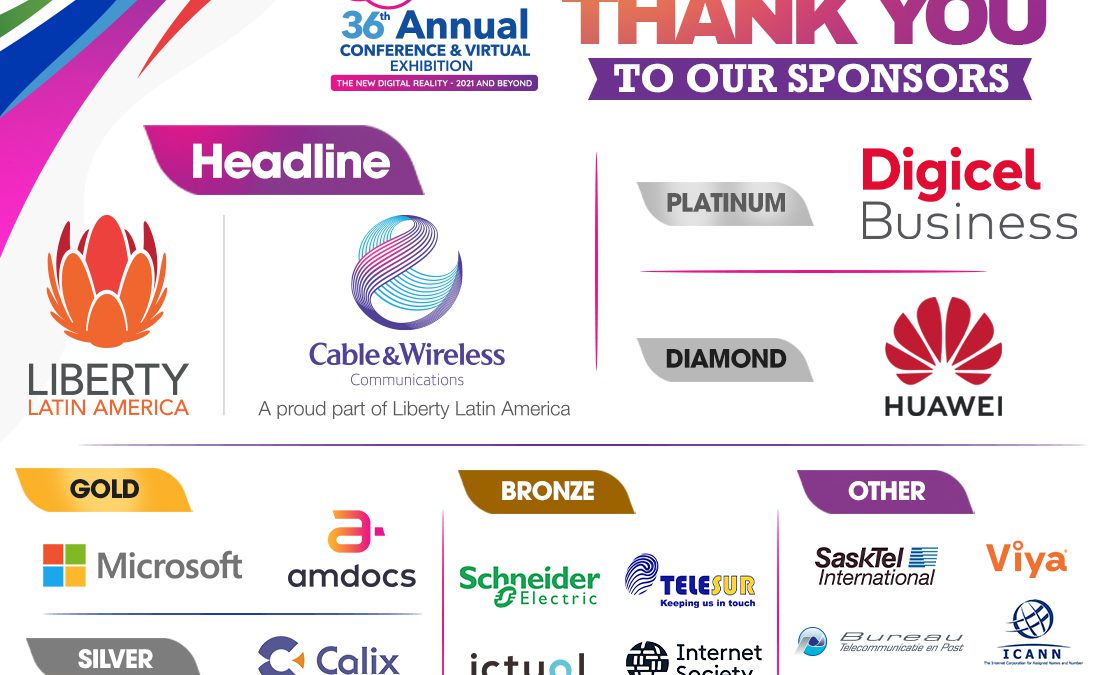CANTO’s 36th Annual Virtual Conference The New Digital Reality 2021 & Beyond- Day 3
Ambassadorial Messages signaled the start of Day 3 – the final day of CANTO’s first on-line Annual Conference and Exhibition.
First to address attendees was United States Under Secretary of State for Economic Growth, Energy and the Environment, Catherine Novelli. Speaking on the topic of “Universal Connectivity, a multi-state approach to digital transformation for social and economic development”, Ambassador Novelli acknowledged Telecoms providers as being the economic heroes of Covid, noting that without access to broadband, the effects of the pandemic on the economy would have been much worse. Pointing to a US study conducted in partnership with the World Bank on global broadband penetration and its correlation to Gross Domestic Product (GDP), Ambassador Novelli revealed that a 10% increase in broadband penetration could result in at least 3% growth in a country’s GDP. “It’s the fastest development tool governments can use to connect millions to the internet”.
Emphasising that universal connectivity could only be successfully achieved through engagement with all major stakeholders, Ambassador Novelli briefly called attention to the roles for key stakeholders – Governments to provide a sound Regulatory foundation which would promote competition and foster innovation; Development Banks such as the IDB to recognise broadband buildout infrastructure to be as important as roads and bridges; the private sector to offer technological solutions to allow faster access to all citizens; schools to make online learning more engaging; libraries to innovate digital access to books, magazines, etc; content providers to protect intellectual property; doctors to march forward to telehealth tools; Small and Medium businesses to build on the global access to grow their businesses; App developers to create life-changing apps for digital banking, education, agriculture and farming and conservation etc.
Immediately following Ambassador Novelli, another Ambassador took centre stage on Day 3. Participants were addressed by the United States Ambassador to the Cooperative Republic of Guyana, Sarah-Ann Lynch. Ambassador Lynch also spoke of the heightened awareness of our dependence on telecommunications – the internet, the intranet and the digital space – which the pandemic has created.
She posited that these powerful tools have given rise to questions such as, who owns these tools? How do we access them? What about freedom of expression and usage? The Ambassador suggested that smart regulatory frameworks and input from multiple stakeholders is necessary as half the world is now connected through the use of billions of devices. She noted that digitalization may lift persons out of poverty, formalize the informal economy, increase the efficiency of supply chains, increase productivity and improve the wages of workers.
Stating the importance of the internet remaining flexible and free, she acknowledged the efforts of organisations such as ISOC, IETF, WWC and ICANN. Homing in on the “exciting” and transformative capabilities of 5G networks, Ambassador Lynch spoke to its potential for improving public health and healthcare, transportation and electrical distribution. Security must be prioritized. The Ambassador referenced an upcoming deep dive assessment by the United States Agency for International Development (USAID), into the Regional Digital Ecosystem of the Eastern and Southern Caribbean. She noted the support given to Guyana to strengthen its communications regulatory systems. In closing, Ambassador Lynch reinforced that the United States remains committed to being the partner of choice as the Region’s digital journey progresses.
Concerns regarding mental health are fast becoming increasingly important as populations seek to adjust to life during a pandemic. Continuing the eclectic mix of topics introduced by CANTO during its 36th Annual Conference and Virtual Exhibition, participants on day 3 were made aware of the Mental Health and Psycho Social Support (MHPSS) Framework by Ms Maria O’Brien of Mindwise. The MHPSS was established by the Inter Agency Standing Committee, a committee of the United Nations, which now operates in over 50 countries.
In Trinidad and Tobago, the MHPSS is a division of the Ministry of Health. Specifically, Ms O’Brien is the Project Lead of the FindCareTT.com Initiative, the National MHPSS Crisis Support Directory of Services of Trinidad and Tobago.
FindCareTT has been developed to close the gap of poor access to mental health services and poor availability of data on Caribbean mental health. FindCareTT has been developed by several partners including the Ministry of Health, the WHO and PAHO. It may be regarded as a covid-19 pandemic response and an innovation in mental health services in Trinidad and Tobago.
Underlining the necessity of excellent customer service were two insightful customer care specialists. The first to present was Ms Sacha Thompson, the Founder and Chief Evolution Officer of the Customer Experience Company Limited; who was followed by Mr Joe Kohegyi, Director, Market Channel Activation, Calix.
In her discussion titled, The Power of AI in Engaging the Customer, quoting from Forbes, Ms Thompson stated, “by 2025, 95% of customer interactions will be supported by AI technology”. She expressed the sentiment that customers must be viewed from Outside In rather than Inside Out as the Inside Out approach reflects “our own experiences” and not those of the customer. In talking about the “connected customer”, Ms Thompson further noted that “the bottom line is AI is the key to delivering a superior customer experience”. However, to successfully win with AI, one must:
- Collect actual real-time customer data and apply AI tech to bring out valuable customers insight with speed and accuracy;
- Create data-driven personas and more personalised experiences;
- Approach AI from an outside in Customer Journey perspective; and
- Make sure to do the proper research when seeking to utilise AI as there is an unlimited number of AI customer engagement tools available. Choose the most appropriate for your business.
Mr Kohegyi, in his presentation, Aligning Subscriber Experience to Data Driven Marketing, noted that there must be a meaningful connection between people and technology. He advocated the establishment of KPIs, accurately capturing data and the creation of personalised touchpoints through the Customer Journey.
A thought-provoking slide suggested: Corporate Marketing, Member Communications, Internal Product Support ≠ New Customer Acquisition, Upsell/Cross Sell, Retention/Loyalty.
Disrupt or Die – Teclos Working together to Enhance Digital Innovation was the hard-hitting title of the address by Mr Keino Cox, General Manager, Emerging Technologies and Innovation, Telecommunication Services of Trinidad and Tobago (TSTT). Launching into his topic, Mr Cox questioned his online audience, “what’s keeping Telco bosses awake at night”? The answer, OTT players coming into the space previously occupied by Telcos and taking business.
The solution, Telcos have to adapt, must move into the headwinds of change. Cox cited Turkcell of Turkey and their browser Yaani, which surfaces local content first and Norway’s Telenor offering ground-breaking 5G solutions for fish farming and car parking management. Reinforcing that Telcos are responsible for the connectivity that powers everyday life; he expanded that responsibility to now becoming more that just a utility but also a digital player, a digital enabler of Fintech, IOTs, analytics and cybersecurity; an enabler of digital transformation. Cox highlighted TSTT’s own transition to offering Cloud Services.
Taking his own advice, General Manager Cox closed on a surprise note, as he launched a new service with partner CANTO, “e-tender”. E-tender is TSTT’s and CANTO’s new e-auction and e-procurement marketplace. Welcome to a new space to access vendors worldwide.
Huawei’s Cloud Business Manager for Central America and the Caribbean, Mr Pablo Oliveros took the audience to new heights with his contribution, New Generation Cloud Infrastructure enables Digital Sovereignty. Admitting that it is sometimes a rough journey to detach from the traditional, Mr Oliveros reassured that there was no need to be afraid of the Cloud. No longer should the Cloud be viewed as a novelty but rather a commodity.
Taking viewers along the road of the Transformation of Governance, Oliveros described the Electronic Information era of the 1950s to the Online Services era of the 1990s then through the 2010s era of Service Convergence arriving at the Intelligent Governance era of the 2020s, characterised by growing AI applications and the dominance of Big Data. Today’s digital transformation is changing All sectors including Government (smart, safe cities); Education (personalised options); Healthcare (tech-assisted diagnosis); Telecoms (customer service); Oil and Gas (precision drilling); Agriculture (optimised fertilisation); Retail (unmanned storefront kiosks).
Shahar Dumai, Head of Marketing, AMDOCS, enlightened the audience with The Digital Experience – What you need to accelerate growth with a digital brand. He advised to start small with a lean operation. Attract specific segments not penetrated by large brands, such as youth or the digital savvy audience. Give a mobile first (or only) experience.
Dumai further advocated that SaaS is the perfect match for digital brands. Should the need be fast time-to-market, the solution could be packaged customer journeys and business processes; extensive business configurations to empower business users. High scalability (technical and business) calls for extensive use of cloud-native services for high elasticity, telco-grade core for scale. If the need is an appropriate cost structure to meet the business model, a low setup-fee and pay-as-you-grow model supported by cloud infrastructure is available.
The afternoon period was the setting for the first panel discussion of Day 3. Moderated by Leisel Douglas, Creative & Communications Lead @ LTE Executions, panellists were Kevon Swift, Head Strategic Relations and Integration at the Latin America and Caribbean Network Information Centre (LACNIC); Bevil Wooding, Director of Caribbean Affairs, The American Registry for Internet Numbers (ARIN); Albert Daniels, Senior Manager, Stakeholder Engagement, The Internet Corporation for Assigned Names and Numbers (ICANN); and Shernon Osepa, Director, Caribbean Affairs and Development, the Internet Society (ISOC).
Conversing on the State of the Internet-Significant Trends and Changes in year 2 of the Pandemic, the panellists shared key facts and opinions with viewers:
Bevil – IP number resources remain the same as before. The pandemic accelerated Government and other services online. More consumers had to go online, generating more economic activity. However, gaps were exposed. He further revealed that the Region needs more investment in Infrastructure, more investment in local skills and talent. Policies were required to protect consumers, the Government and national interests. Greater local and Regional participation is essential in fora where decisions are made, especially in discussions where we can voice how the internet affects the Caribbean. An interconnected approach and collective responsibility could generate creative solutions, ensure more dialogue and research into the Caribbean’s use of the internet.
Albert – The internet did not break. It remains suitable for usage at home. There is need for a secure, stable, reliable internet, not just bandwidth but also core internet infrastructure. The internet is robust and reliable. We, in the Caribbean, can contribute to shaping the internet. He encouraged persons to find out about the work of LACNIC, ICANN and ISOC.
Shernon – Overall traffic over the internet grew some 200% over the period of the pandemic. The Caribbean registered a traffic increase of over 40%. Changes in application use noted – more use of conference applications. 9pm – 5am were more active on the internet. There was a more than 50% decrease in mobile usage especially roaming services. There was no congestion on cloud platforms but rural areas have difficulty in accessing cloud services. Understandably there was a decrease in travel/booking applications. There are big differences in internet penetration in the Caribbean Region ranging from 25% penetration to 90% penetration.
Kevon – More production of local content is needed in the Caribbean. There is now a huge potential for online events. He challenged his panel colleagues to work on public information campaigns advocating local content. He also reinforced that Digital Transformation cannot forget the digital divide. Crises must be prevented eg in education.
The second panel for the afternoon tackled a Blueprint for Financial Technology – Digital Currency in the Caribbean. CANTO Director Mark Reynolds, Vice President of Legal and Regulatory Affairs at Guyana Telephone and Telegraph moderated the dialogue between Bartlett Morgan, Attorney-at-Law (Digital Law and Dispute Resolution) at Chancery Advocates and Stephen Phillips, Founder and Principal Consultant at IMHOTEP Consulting Inc.
As the discussion opened Bartlett suggested that Telcos should not isolate fintech, a position which Director Reynolds could appreciate as GTT operates the successful subsidiary, Mobile Money Guyana.
Stephen noted that Fintech was not a threat but an opportunity. Fintech allowed for an enhanced customer experience with use of blockchain to facilitate digital payments.
Bartlett stated that in markets globally, there is a take -up of Fintech products. Regulators also have a part to play. When Regulators take a welcoming approach, hurdles are less. Those fintech products flourish. Strict rules may create a negative impact. He highlighted that there were many attempts in the Caribbean to roll out fintech products but the level of strictness may determine the level of success of a product. He also stressed that privacy is an important factor in the roll out of fintech.
Doing double duty, Director Reynolds hosted the penultimate session of Day 3 as CANTO’s Annual Conference and Virtual Exhibition powered down its 36th edition. Director Reynolds engaged Jamaican entrepreneur Gordon Swaby, CEO and Co-Founder of Edufocal Limited in a thoughtful fireside chat. Once again bringing education into focus, Reynolds and Swaby’s conversation revolved around Education and Connectivity for Caribbean Citizens.
EduFocal is Jamaica’s leading online learning and exam preparation platform for grades 4-6 students. Swaby, who had co-founded Edufocal some 9 years ago at age 21 disclosed that over 60,000 students had logged on to the site during the height of the pandemic. He did point to the downside of the gaps in internet penetration pervasive in the Caribbean, noting that Jamaica and Guyana had lower penetration rates than Barbados, Trinidad and Tobago and The Bahamas. He suggested that ISPs could consider preloading the app on the phones sold by them.
He attributed his company’s success to public/private partnerships. About the impact of CARICOM he believed that CARICOM is important if it operated as a single unit with a shared vision. He is also of the view that the Caribbean is self-sufficient if you considered all our resources collectively. “Don’t try to copy wholesale what is happening in other jurisdictions. Instead, look, learn and adapt to our purposes”.
Almost in the style of call and response, host Wendell Etienne and CANTO Secretary General, Teresa Wankin, brought to an optimistic close CANTO’s 36th Annual Conference and Virtual Exhibition. Viewers were left with teasers to the re-start of CANTO Conversations in September, ongoing capacity building initiatives for members and a save the date for CANTO 2022 from July 17th-20th!
Just when they thought it was all over, viewers still online were treated to “Showcase Barbados”. Robert Chase, Interim Chief Executive Officer of Barbados Tourism Marketing Inc. CEO Chase promoted Barbados’s Welcome Stamp. Created in July 2020, the 12-month Visa allows medium/long-stay visitors to live, work and play in Barbados for up to a year. It is available to individuals, couples or family groups. To date some 4,800 persons had opted for the Welcome Stamp. This initiative has been extended for another year.
The country’s use of Technology in Tourism was also highlighted, such as the incorporation of VR and AR Experiences to increase awareness of attractions and generate new revenues for stakeholders. The Banking sector has introduced contactless payment systems across the country. The CEO revealed that new opportunities were opening up in Barbados for prospective, innovative ICT players.
There ended the 36th Annual Conference and Virtual Exhibition – the New Digital Reality 2021 and Beyond.



